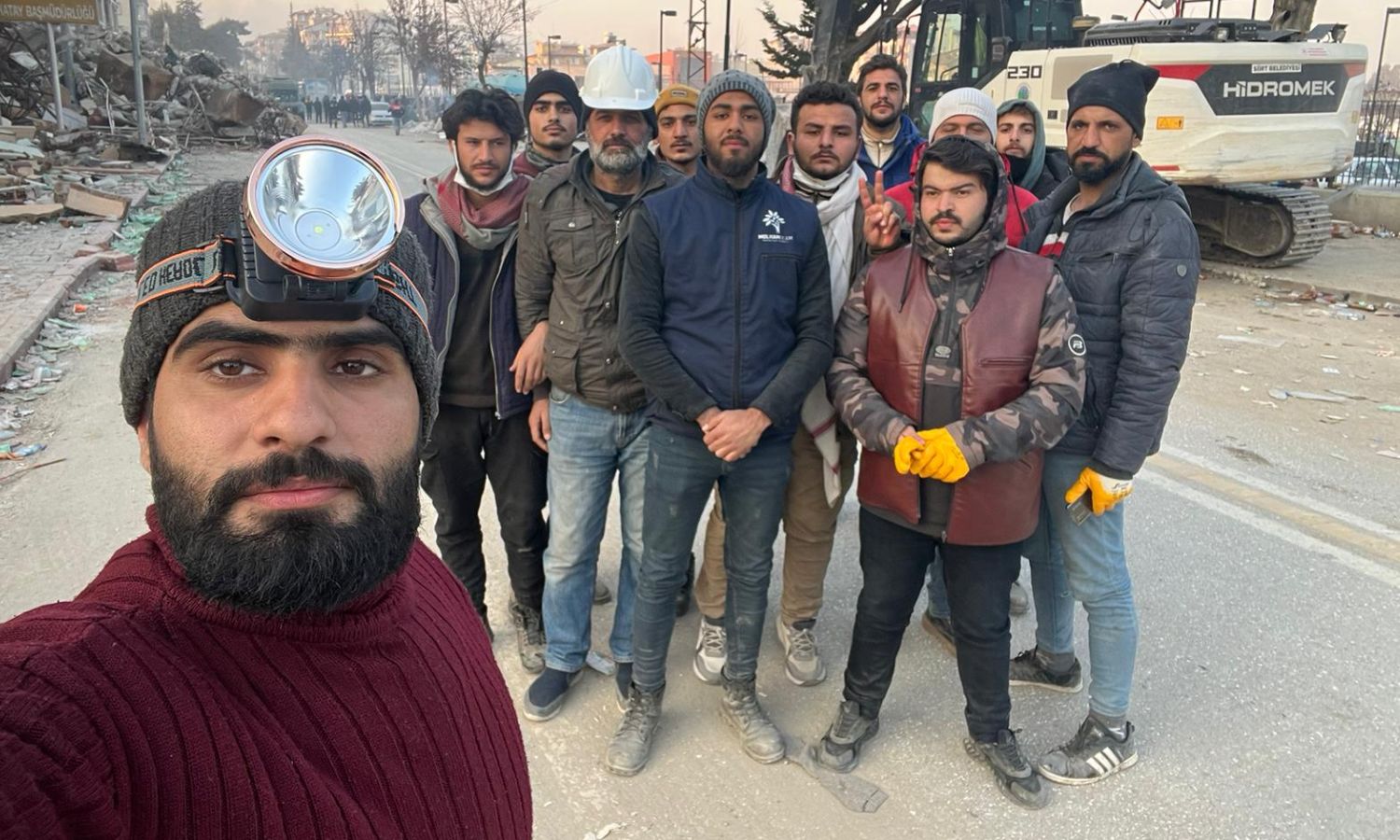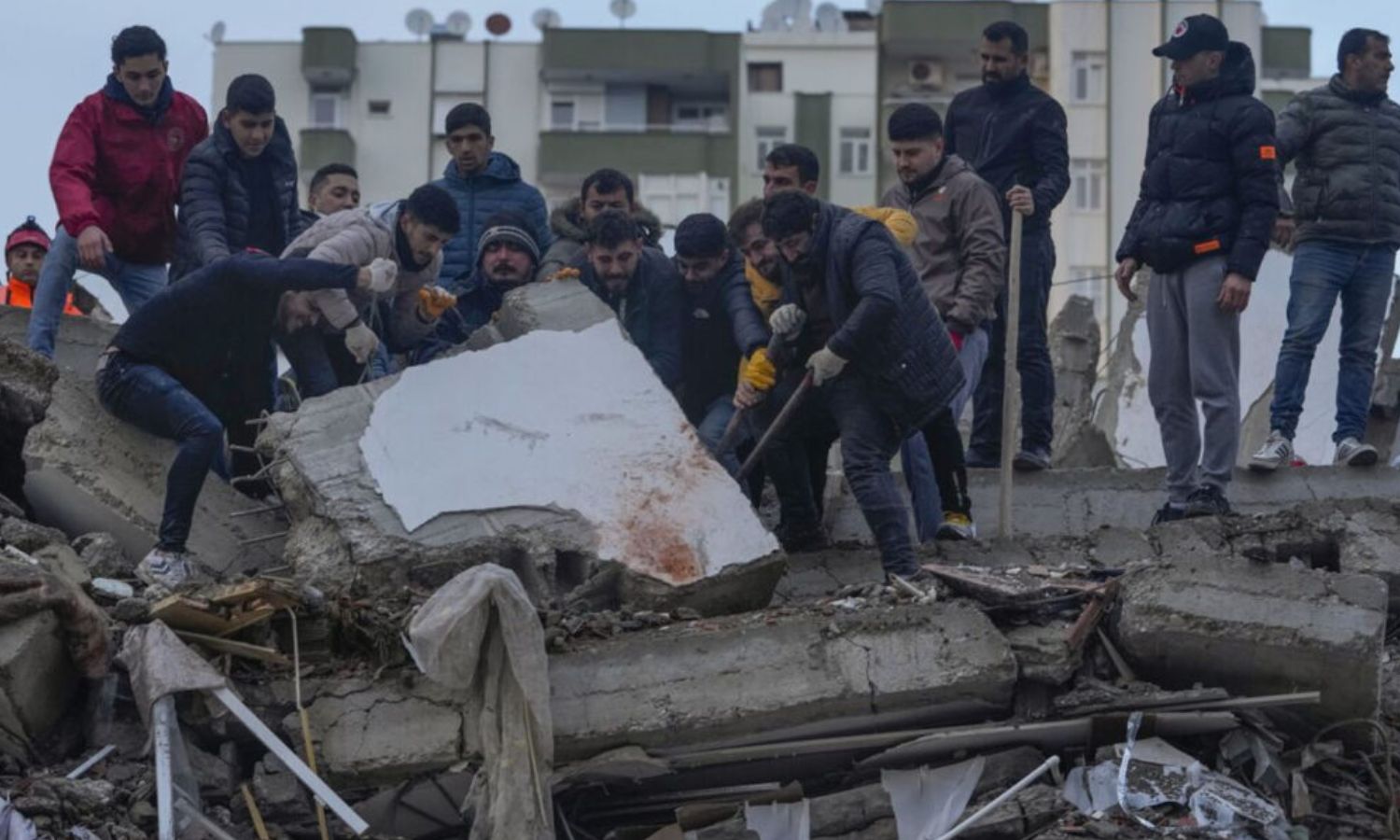



Enab Baladi – Lujain Mourad
“My sense of responsibility overcame my fears, prompting me to make the decision to leave the safe zone and search for any means to help and mitigate the disaster,” Aya Khabour, a university student residing in Istanbul, told Enab Baladi about the reason for her participation in relief work in southern Turkey.
The student and the head of the relations office in the Syrian Student Union went to Gaziantep on the fourth day of the earthquake as part of the “In Support for Them” campaign, which was launched with student efforts and in cooperation with the Turkish “Iqra” association.
In addition to sending volunteers to participate in its distribution, the campaign collected in-kind aid and sent it to shelters in the affected areas.
Khabour’s motives are not different from that of university student Lawrence al-Shamali, who decided a day after the earthquake to go from his area of residence in Urfa to Antakya, as it was the most affected area.
Despite the fears of going to the affected places without having a travel permit and without guidance from Turkish organizations and institutions, al-Shamali posted on Facebook a call to young people wishing to volunteer in search and rescue operations to join him and his friends on their trip to Antakya, according to what he told Enab Baladi.
Hours after the earthquake occurred, calls emerged in Syrian student groups on social media to volunteer and participate in relief, search, and rescue work.
Dozens of Syrian students went to the affected areas in response to the disaster, some of them as part of personal initiatives and at their own expense, and others in partnership with Turkish associations and organizations, according to what was monitored by Enab Baladi.
“We have witnessed similar tragedies, and we have repeatedly dealt with bodies stuck under the rubble as a result of the bombing of the Syrian regime.” This is what made al-Shamali feel that there was something to offer in this disaster.
The young man worked with about 16 of his acquaintances and friends as part of the search and rescue operations by going to the demolished buildings and trying to ascertain whether there were any survivors under the rubble in order to request rescue teams immediately.
“Is there a sound here?” a phrase repeated by al-Shamali and his friends, looking for any sound that would inform them of the presence of a person alive under the rubble of buildings.
The young man added that the rescue teams were not able to respond to all their calls, which prompted them to start digging and rescue operations with simple equipment they brought with them, and by using this equipment, they were able to save many people.
While Khabour and her colleagues worked in the Union of Syrian Students to provide the needs of the shelters, help with cooking, distribute meals, and translate for the affected families.
The Syrian Student Union also launched several services in response to the disaster, most notably the “I Need a Translator” service, to help families who are unable to communicate in Turkish, according to Khabour.
Khabour indicated that many Syrians do not master the Turkish language, especially in those areas where the Turkish population speaks Arabic well.
In addition, the students worked to provide translation services for Turkish government decisions and to provide a portal through the Student Union website to help the families of missing persons find their relatives and to help families reach shelter centers in various states.

Rescue operations continued in search for survivors under the rubble of a building in Adana, Turkey – February 6, 2023 (AP/Khalil Hamra)
“We were sure that the disaster was the same for the Syrians and the Turks, and we did not differentiate in providing services between them,” Khabour talked about the motives of the volunteer students and their humanitarian nature in the first place.
She continued, “It was a shock for all of us that the relief work, in these circumstances, could carry racist attitudes,” referring to the fact that many Syrians affected by the earthquake in shelters were discriminated against, especially those who were not proficient in the Turkish language.
Khabour and the student volunteers tried to limit the impact of these situations, which made many affected Syrians see them as a “savior,” according to what she said about a family that was threatened with expulsion from the shelter, and the volunteers succeeded in preventing that from happening.
For their part, the volunteers in the rescue teams repeated calls in Turkish, coinciding with Arabic, to confirm that their sense of responsibility for rescuing those trapped under the rubble did not differentiate between a Syrian or a Turk, according to al-Shamali.
The young man criticized their exposure to many racist attitudes during work, prompting them to leave Antakya after working for more than five days.
“Syrians must get out of here” is a phrase that the volunteers repeatedly heard, which made them vulnerable to searches by the Turkish police, transforming their work from search and rescue into attempts to defend themselves and confirm their desire to help only.
“Many of us used to check on their families in the afflicted areas and go out to help and provide everything they could,” said Khabour, indicating that the damage that befell the Syrians did not prevent them from helping.
Despite the return of Aya Khabour, Lawrence al-Shamali, and other volunteers to their places of residence, the distress of the affected families who have suffered repeatedly from bombing, displacement, and the cruelty of asylum is still stuck in their minds.
About one million and 750 thousand Syrian refugees reside in the cities of southern Turkey affected by the earthquake, while the total number of Syrian refugees in Turkey is about 3.5 million.
During the past few days, hundreds of Syrians mourned their relatives in Turkey on social media, including families who lost their entire families under the rubble as a result of the earthquake.
Despite the absence of statistics on the number of Syrian refugee deaths in southern Turkey, human rights activist Taha al-Ghazi, who specializes in Syrian refugee issues, estimated, based on non-governmental organizations, about 6,100 deaths as a result of the earthquake until February 15.
if you think the article contain wrong information or you have additional details Send Correction